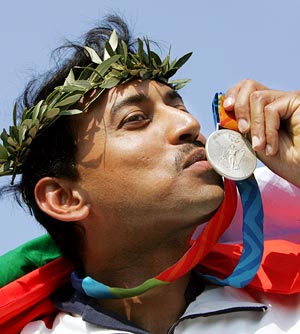 They were India's top two shooters at the last Commonwealth Games, in 2006, but four years on they will watch the Delhi Games from the sidelines.
They were India's top two shooters at the last Commonwealth Games, in 2006, but four years on they will watch the Delhi Games from the sidelines.
Rajyavardhan Singh Rathore won India's first silver medal at the 2004 Olympics in Athens and followed it up with a gold and silver at the Commonwealth Games in Melbourne two years later, while Samresh Jung won five gold, one silver and a bronze at the Melbourne Games, the feat earning him the nickname 'Goldfinger'.
The duo were hoping to repeat their success in front of home fans, but a rigid and an 'unfair' selection policy cost them places for the mega-event.
The National Rifle Association of India (NRAI) formulated a new selection policy in March which all but dashed the chances of a few top shooters like Rathore, who spent a few months recovering from illness or training alone.
According to the new selection policy, there is a base score from whereon aggregate scores keep adding on -- from the National Championships and other trial events.
The policy also rewards merit points for those winning top level competitions and an Olympic quota place. The aggregate points of each trial add on and, finally, the one with the higher aggregate is selected.
Strangely, the NRAI decided to include baseline scores from February even though the policy was implemented only in since March this year, which was unfair to a lot of top shooters. Also, the current form of the shooter was not considered.
For example, even if Jung or Rathore were to win a World Championship gold with a record score in September, they would fail to make it to the Indian team for the Delhi Games.
This aggregate system is similar to a deficit system, wherein if a shooter is in poor form at the start of the year, and hopes to get into the Indian team by June, he must first shoot a high score to fulfill the deficit score of February and then score higher than what others scored in June.
So even if you shot a world record at the trials in June, you would not beat the others, since they already have a lot in reserve from their competitions earlier in the year.
Therefore, it was not a surprise that a few top shooters opted to miss the three-day selection trials in Pune, knowing fully that barring a miracle they would not make it to the Indian team.
National coach Sunny Thomas said it was important for Rathore to put up a good show at the trials to qualify for the Delhi Games.
"I don't know why he did not come. His scores since February were not good and it was important for him to do well in the trials and be eligible for selection," Thomas said.
However, Thomas should have been aware that Rathore could not take part in international events because of this very aggregate system.
For a shooter like Rathore, who had planned a gradual return to the sport this year to be in the best shape for the Commonwealth Games, the new policy has come as a big blow.
The federation may try to veil their sham policy in the disguise of consistency, but it is clear that there are many flaws in the selection policy. Ask the shooters!
One just hopes that the sports ministry wakes up to this ugly controversy --- one of the many to have dogged the Games so far.







 © 2025 Rediff.com -
© 2025 Rediff.com -